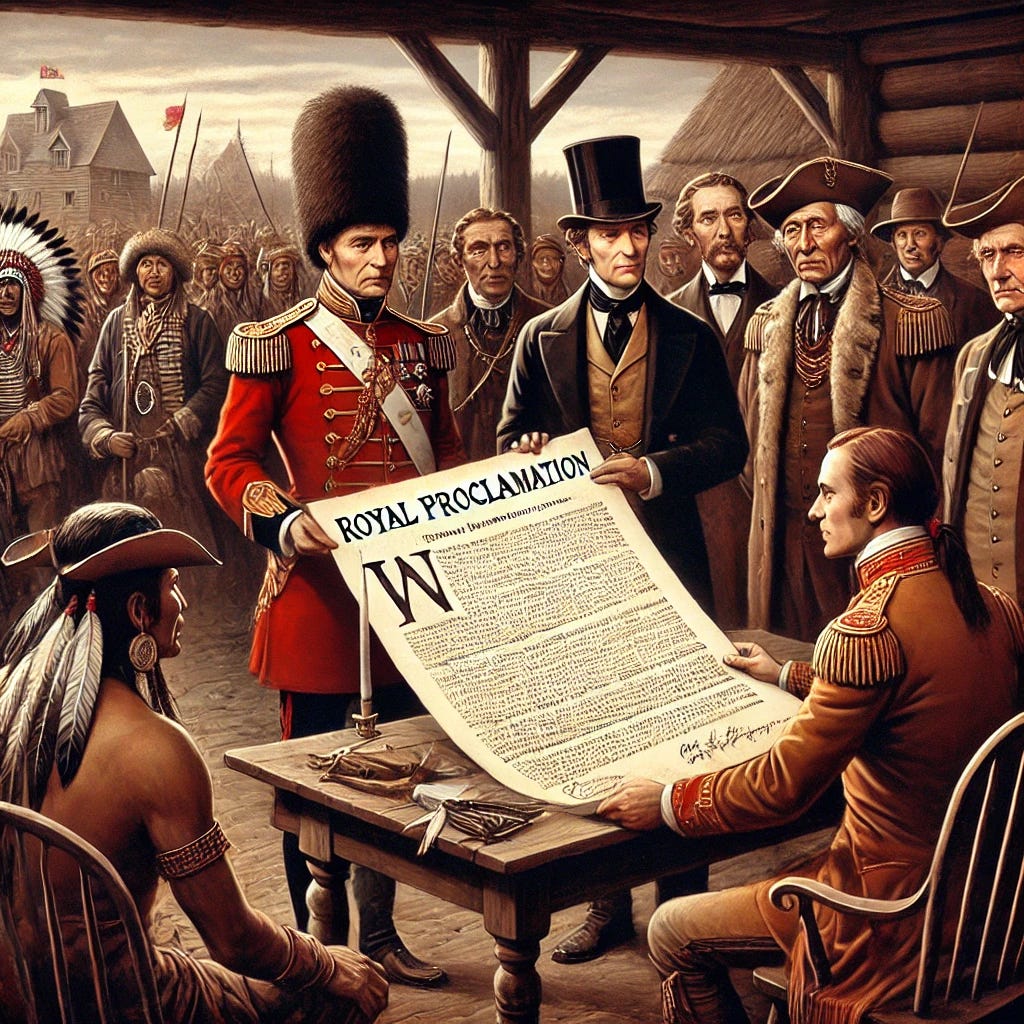Introduction
The Royal Proclamation of 1763 is one of the most significant legal documents in the history of British-Nation relations in North America. Issued by King George III on October 7, 1763, it established British control over newly acquired territories following the end of the Seven Years' War. More importantly, it set out clear rules regarding land ownership and governance, particularly stating that lands west of the Appalachian Mountains were reserved for the First Nations and that only the Crown could negotiate land sales.
This proclamation remains a foundational document in modern land claims and legal cases concerning First Nation sovereignty and treaty rights in Canada.
Historical Context
After the Treaty of Paris (1763), Britain gained control over vast territories previously held by France, including Quebec, Ontario, and much of the interior of North America. British officials, concerned about rising tensions with the First Peoples, issued the Royal Proclamation to establish formal rules regarding settlement and land ownership.
Key concerns at the time included:
Preventing unauthorized British settlement in lands still occupied by Nations.
Establishing a legal framework for land transactions to avoid further conflict.
Setting up new colonial governments in Quebec, Florida, and other former French territories.
The proclamation affirmed the autonomy of the First Nations and their right to land ownership, but it also asserted British authority, creating long-term disputes over sovereignty and land rights.
Full Text of the 1763 Royal Proclamation (Key Excerpts)
Recognition of Tribal Land Rights
"And whereas it is just and reasonable, and essential to our Interest, and the Security of our Colonies, that the several Nations or Tribes of Indians with whom We are connected, and who live under our Protection, should not be molested or disturbed in the Possession of such Parts of Our Dominions and Territories as, not having been ceded to or purchased by Us, are reserved to them, or any of them, as their Hunting Grounds..."
"We do therefore, with the Advice of our Privy Council, declare it to be Our Royal Will and Pleasure, that no Governor or Commander in Chief in any of Our Colonies or Plantations in America do presume, upon any Pretense whatever, to grant Warrants of Survey, or pass any Patents for Lands beyond the Bounds of their respective Governments, as described in their Commissions; as also that no private Person do presume to make any Purchase from the said Indians of any Lands reserved to the said Indians, within those parts of Our Colonies where, We have thought proper to allow Settlement..."
Only the Crown Could Buy Land from the Nations
"And We do further declare it to be Our Royal Will and Pleasure, for the present as aforesaid, to reserve under Our Sovereignty, Protection, and Dominion, for the use of the said Indians, all the Lands and Territories lying to the westward of the Sources of the Rivers which fall into the Sea from the West and North West as described in Our Proclamation, which are reserved to them for their Hunting Grounds..."
"And We do further strictly enjoin and require that no private person presume to purchase any lands from the said Indians, but that if, at any Time, any of the Said Indians should be inclined to dispose of the said Lands, they shall be purchased only for Us, in Our Name, at some public Meeting or Assembly of the said Indians, to be held for that purpose by the Governor or Commander in Chief of Our Colony..."
Punishment for Unauthorized Settlement
"And We do hereby strictly forbid, on Pain of our Displeasure, all Our loving Subjects from making any purchases or settlements whatever, or taking possession of any lands in the territories reserved for the Indians, without Our special leave and license..."
"If any person shall willfully or inadvertently have seated themselves upon any of the lands reserved for the Indians as aforesaid, they shall forthwith remove themselves from such settlements, and if they fail to do so, Our Governors and Commanders in Chief are required to remove them forthwith."
Creation of New Colonial Governments
"And whereas We have thought fit, with the Advice of Our Privy Council, to erect, within the Countries and Islands ceded and confirmed to Us by the Treaty of Paris, four distinct and separate Governments, styled and called by the Names of Quebec, East Florida, West Florida, and Grenada, and limited and bounded as follows..."
Key Takeaways
Recognized First Nation Land Ownership – The British formally acknowledged that the First Nations had rights to their lands.
Restricted Private Land Sales – Only the Crown could legally purchase land from the First Nations.
Prohibited Unauthorized Settlement – British settlers were forbidden from occupying land reserved for the First Nations.
Established British Control Over Governance – The proclamation created new colonies, including Quebec, and set the groundwork for British legal and administrative rule.
Did the Proclamation Hold?
British Settlers Ignored the Land Restrictions – Many settlers continued to encroach on First Nation lands, leading to conflicts.
The Crown Did Not Enforce Its Own Rules – The British government failed to prevent land theft and illegal settlements.
Used in Modern Court Cases – The proclamation is still referenced in modern land claim disputes and was a foundational document in Canada’s recognition of First Nation rights.
Lasting Impact
The Royal Proclamation remains legally significant in Canada, particularly in land disputes.
The Canadian Constitution Act (1982) references the proclamation, affirming that First Nation rights exist and must be upheld.
Some First People see the proclamation as proof that they never surrendered their lands, leading to modern legal challenges against government claims of sovereignty.
Next in the Series
The next post will cover the 1774 Quebec Act, which revised British policies on governance and land rights, influencing later treaty-making in Canada.





